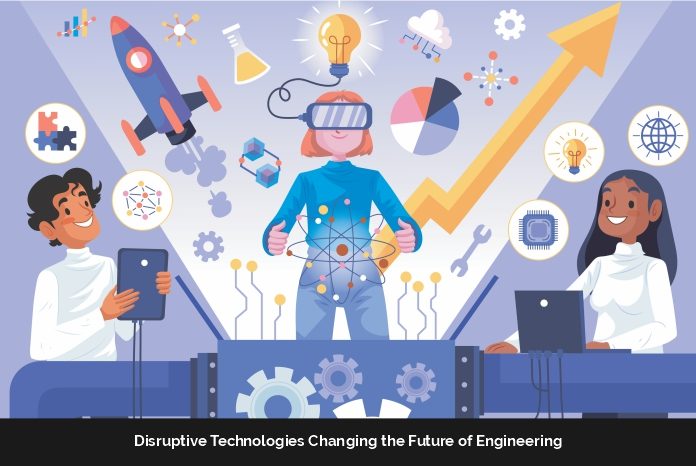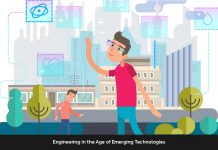
Global advancements in science and technology, coupled with emerging business models and increasing consumer demands, are rapidly transforming industries like engineering.
Emerging technologies, such as smarter machines and connected systems, enable faster, more efficient, and sustainable product design, paving the way for a new era of engineering innovation. Disruptive technologies are innovative changes that impact organizational growth. Engineering leaders understand their impact, optimizations, and adoption to stay updated with shifting demands and implement changes to futureproof their organizations.
In this article, we assess four of the most disruptive technologies that are impacting the engineering sector.
1. Augmented and virtual reality
The first in our list of disruptive technologies is augmented reality (AR) and virtual reality (VR).
Virtual reality (VR) and augmented reality (AR) are two technologies that are changing the way we use screens, creating new and exciting interactive experiences.
Augmented reality overlays imagery, video, or text onto a physical landscape, allowing maintenance professionals and medical engineers to view, learn, and implement repairs directly. Virtual reality, typically viewed through a VR headset, provides a simulated real-world environment, allowing engineers to demonstrate full-scale designs and make necessary adjustments.
Augmented reality and virtual reality are tools that enable engineers to design and visualize 3D data in real-life scenarios.
2. 5G
5G is the latest generation of networking, significantly impacting engineering from research and development to design and manufacturing.
Leading mobile providers have already highlighted the advantages of 5G technology, that include faster speeds, lower latency, and more reliable connections. It also aids in advanced engineering solutions like smart cities and autonomous driving. More than half the western population has invested in smart technology, such as 5G-connected lampposts. The reduced latency of 5G will provide safety information to autonomous vehicles.
For engineers, 5G will improve building design, vehicle manufacturing, and transport facility operations. Faster connectivity will also enhance team collaboration.
3. Big data
As 5G enhances information access speed, big data aids engineers in identifying and analyzing trends in health, safety, and costings.
The use of Big Data in the field of space research has been very useful, especially in the study of black holes. Big data science in construction allows engineers to analyze statistics like health and safety near misses and accidents, detecting risks and reducing future accidents. It also helps predict budgets for upcoming projects more accurately, reducing expenses and improving profitability by assessing costing patterns and wastage.
Big data engineering involves managing high-volume data sets from diverse sources within an organization, designing pipelines to transport and transform data for end users like business analysts and data scientists.
4. Artificial Intelligence
AI, an emerging disruptive technology, can interpret large amounts of data and learn from it to support autonomous tasks that previously relied on human input. AI engineering is an emergent discipline focused on developing tools, systems, and processes to enable the application of artificial intelligence in real-world contexts.
AI Engineering is taking shape as a discipline already across different organizations and institutions. AI software can be used by engineers in design to identify structural defects, crucial for operational and health and safety reasons. In medical engineering, AI can be used to program surgical robots, enhancing precision and control in complex tasks. The use of Artificial Intelligence, AI, in the military industry worldwide is already a reality.
The importance of understanding emerging technologies for Engineers:
Emerging technologies are innovations that incorporate improvements to developments that are still in early stages, or the term can even refer to a continuous improvement of an already developed technology. The application of these technologies often leads to the redefinition and optimization of procedures, as these implementations have substantial benefits.
The main benefits of disruptive technologies include the ability to improve efficiency and productivity in a number of specialized fields, e.g., medicine, education, research, engineering, etc. They also help to reduce costs and improve productivity.
Engineers are highly crucial in comprehending emerging technologies due to their potential advancements and advancements. Engineering leaders face a significant challenge in understanding emerging technologies and being prepared to adopt them when they’re right, as failure could lead to wasted resources or competitors gaining a significant lead in a new product or business model.
However, engineers without a doubt have been enhancing efficiency and productivity in engineering projects by learning about new technologies and their potential applications, thereby solving problems and creating value for everyone.




















